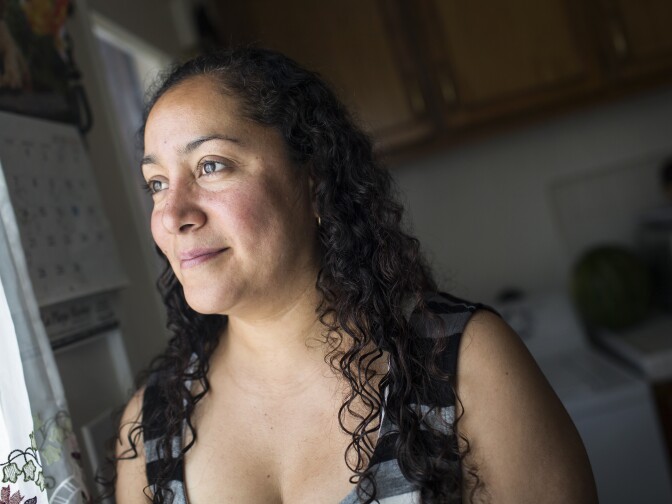This story is free to read because readers choose to support LAist. If you find value in independent local reporting, make a donation to power our newsroom today.
This archival content was originally written for and published on KPCC.org. Keep in mind that links and images may no longer work — and references may be outdated.
After Supreme Court ruling, what's next for unauthorized immigrants seeking work?
Many unauthorized immigrants had pinned their hopes on getting work permits through President Obama’s immigration plan, but the U.S. Supreme Court recently placed the plan on hold, raising questions of what might be next for those looking to work in California legally.
California is among the most liberal of the states in granting benefits to those living in the U.S. without legal status. So immigrants like Xochitl Camberos have options even if work permits are still not allowed.
Camberos used to work as a nurse in Mexico. Since arriving in 2008, she hasn’t been able to work much because she is in the country illegally. She came on a tourist visit and said she overstayed.
Despite her status, she may be able to work as a nurse in California soon. Camberos is one of about 3,000 people who have applied for a professional license through a new state law.
The law referred to as SB 1159 allows those who don’t have Social Security numbers to seek professional licenses covering 39 disciplines, including nursing, architecture and cosmetology. Instead of Social Security numbers, applicants can use an Individual Taxpayer Identification Number, or ITIN, which is submitted when unauthorized immigrants pay taxes.
Federal law prohibits employers from hiring unauthorized immigrants. But nothing currently stops those residing here illegally from opening a business or working as an independent contractor.
While Camberos couldn't work for a hospital, she could go into business for herself as a home care nurse, which is what she plans.
So each morning, Camberos drops her two kids off at school, then she heads back to her Inglewood apartment to study for her state nursing license.
“I'm so excited because, oh my God, finally…I can work," she said.
Not everyone is thrilled about the prospect of unauthorized immigrants working legally in this country. Already, such immigrants represent an estimated 5.1 percent of the U.S. work force, about 8.1 million people, according to Pew Research Center. Those who favor stricter immigration rules are critical of the immigrant-friendly laws that California has enacted in recent years, arguing the state has overstepped its bounds.
“What are you going to expect when immigration has completely changed the political nature of the state, other than kind of the nullification of federal immigration law?" said Mark Krikorian, executive director of the Center for immigration Studies, a Washington, D.C.-based think tank that favors tighter immigration rules. "This really isn’t that different from what South Carolina did before the Civil War. They were essentially trying to negate federal law, because they didn’t like it.”
There are other ways immigrants without work permits can earn income legally, not only in California but in other states as well.
Olga Cordero and her husband could have qualified for work permits under Obama’s now frozen immigration plan, but they don’t really need them for the work they do.
“Thank God, I have not needed a Social Security number or a work permit, because we can make our own dream, as owners and proprietors of a business,” Cordero said.
She and her husband own a small jewelry store in North Hollywood. So long as they pay taxes, they are legally self-employed.
Cordero arrived in the country in the late 1980s and couldn’t find jobs that paid well. She worked as a babysitter and in restaurants – and saved every penny for the capital to start their business.
“When you want something, you have to sacrifice something. Going out, vacations, luxury purchases in big stores, unnecessary purchases. That was our sacrifice,” she said.
The couple has done pretty well. They now own a spacious home, and a condo that they rent out.
But other unauthorized immigrants are struggling.
Jose Martinez, a day laborer from El Salvador, came to the U.S. 10 years ago when he was 40. He said he would happily start a business as a contractor, but he thinks it’s an impossible goal.
"It would be difficult, because to start with, I don’t have the means to be able to get a license. I'd have to have money,” he said.
Martinez said he supports family members back home. Add in rent and bills, and he said his earnings are gone.
There's a clear division among immigrants between the haves and have-nots — not everyone has the same opportunities.
“There are generational divides, there are class divides, there are all these divides that are separate and apart from immigration status,” said Kevin Johnson, an immigration law expert and dean of the law school at University of California, Davis.
Camberos, the aspiring nurse, has a few advantages. Her husband owns a gardening business and supports them, allowing her to stay home and study. She's also highly educated, with a degree in nursing that she earned in Mexico.
She said she’s eager to get back to nursing.
"I like to feel the adrenaline. I like to want to help people," Camberos said.
She hopes to take the exams that will allow her to work early next year.











